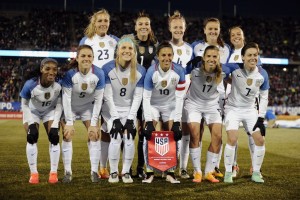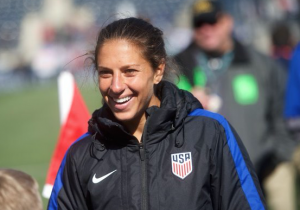By Carrie Mittl
The Olympics can be a valuable platform to showcase different talents and passions, stories and struggles across the representing countries. One of the arguments to choose Brazil as the host country was that the Games would have “transformative power…on the [country]” and that Brazil therefore “need[ed]” the Olympics “more than Chicago d[id], more than Madrid” [1]. Having the global spotlight on the host country has the power to rejuvenate the nationalism in its citizens and to inspire all those who tune in to watch. The Olympics have always been a stage for stories of failure and triumph, adversity and success to be introduced on a global scale. The United States Women’s National Soccer plans to utilize the global attention to shed light on the struggle for equal pay for equal pay [2].
Despite their three World Cup titles, 4 Olympic Gold Medals, record television ratings, and history as the most successful US National team, members of the USWNT are signaling to the U.S. Soccer Federation that they’re done accepting on average about 40 percent of what the men on the USMNT get paid, according to USWNT lawyer Jeffrey Kessler [3]. On March 30th, 2016, five members of the USWNT filed a federal complaint with the Equal Employment Opportunity Commission accusing the federation of wage discrimination [4].
Leading figures on the USWNT have been vocal about the lawsuit and eager to see a change. Hope Solo, goalkeeper since 2000, said the men’s players “get paid more to just show up than we get paid to win major championships” [5].
Carly Lloyd wrote an opinion piece for the New York Times, stating how the time is now for change. She acknowledges the progress that has been made since her time with the team: when she was on the team originally, there were no salaries or health benefits [6]. But, understandably, she is not satisfied with the current inequality.
Throughout her article, Carly provides shocking statistics that are hard to deny:
- The top five players on the men’s team make an average of $406,000 each year from these games while he top five women are only promised $72,000 each year.
- Male players who win the world cup would get a bonus of $390,000 whereas the bonuses for the USWNT most recent World Cup victory was only $75,000.
- Men get $69,000 for clinching a spot on the World Cup roster. On the other hand, women are guaranteed only $15,000.
- “U.S. Soccer projects that our team will generate a profit of $5.2 million in 2017 while the men are forecast to lose almost $1 million. Yet we get shortchanged coming and going.”
- Women receive only $60 a day for compensation when they travel whereas Michael Bradley receives $75.
- Geoff Cameron is paid $3,750 for a U.S sponsor appearance. Hope Solo and Alex Morgan would get $3000 for the same type of deal
During an annual tournament called the Algarve Cup in Portugal two years ago, the United States considered a boycott, but Lloyd attributes not following through to the fact that they “weren’t completely united” [7]. Now, she says they “are not backing down anymore” and have chosen one of the biggest stages to take a stand [8].
“If I’ve learned anything in my career, it’s that nothing worthwhile in life comes easy. That’s just the way it is. This isn’t about a money grab. It’s about doing the right thing, the fair thing. It’s about treating people the way they deserve to be treated, no matter their gender.” ~ Carly Lloyd [9]
The boycott would allow the USWNT to take hold of the global spotlight so that the discrimination is shown to the fellow Americans. The Olympics will allow more Americans to rally around their cause and put more pressure on the federation to take motions toward eliminating the discriminatory gap in their salaries. If the boycott occurs, then their protests will directly affect Americans and their plans to watch soccer during the Olympics. This could be a powerful move, so the United States can only wait in anticipation as to whether or not the players will follow through with the boycott if the U.S. Soccer Federation doesn’t follow through with their demands.
“Simply put, we’re sick of being treated like second-class citizens. It wears on you after a while. And we are done with it.” ~ Carly Lloyd [10]
Stay tuned throughout the summer to see if American favorites like Carly Lloyd and Hope Solo will be wearing the stars and stripes on the pitch. Or if they’ll be watching other countries play on a television screen, remaining loyal to their boycott and awaiting change.
Links
Why Rio? Road to the 2016 Olympics
Notes
[1] Bonnie Ford, “The Promise Rio Couldn’t Keep,” ESPN, February 18, 2016, http://espn.go.com/espn/feature/story/_/id/14791849/trash-contamination-continue-pollute-olympic-training-competition-sites-rio-de-janeiro.
[2] Lindsay Gibbs, “The U.S. Women’s Soccer Team Says Olympic Boycott is ‘On the Table.’” ThinkProgress, April 14, 2016, http://thinkprogress.org/sports/2016/04/14/3769415/uswnt-threatens-rio-olympic-boycott/.
[3] Ibid
[4] Andrew Das. “Top Female Players Accuse U.S. Soccer of Wage Discrimination” New York Times, March 31, 2016, http://www.nytimes.com/2016/04/01/sports/soccer/uswnt-us-women-carli-lloyd-alex-morgan-hope-solo-complain.html?_r=0.
[5] Ibid
[6] Carly Lloyd. “Why I’m Fighting for Equal Pay.” New York Times, April 10, 2016, http://www.nytimes.com/2016/04/11/sports/soccer/carli-lloyd-why-im-fighting-for-equal-pay.html?_r=1.
[7] Ibid
[8] Ibid
[9] Ibid
[10] Ibid
~770 words~
How to cite this article: “Is Rio Ready?” Written by Carrie Mittl and Sam Shapiro, Olympic Football 2016 Guide, Soccer Politics Blog, Duke University, http://sites.duke.edu/wcwp/tournament-guides/olympic-football-2016-guide/is-rio-ready/uswnt-focus/, (accessed on (date)).


